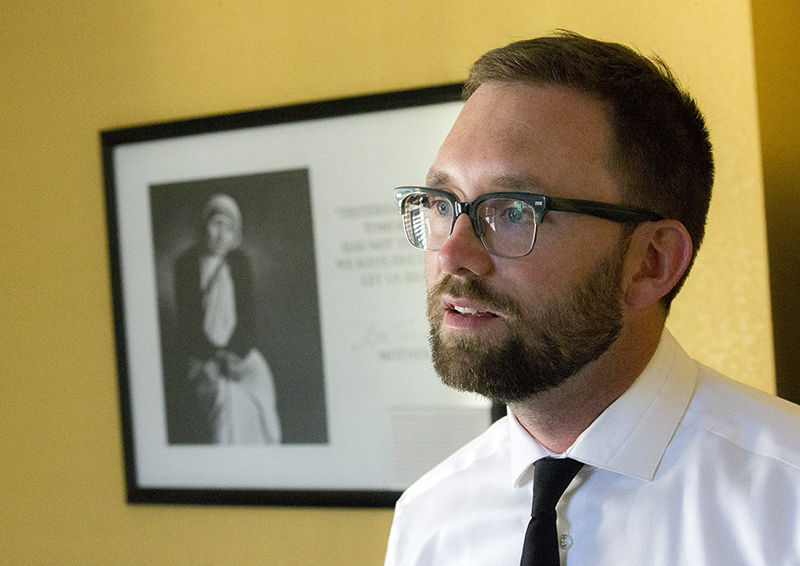It starts with a cup of coffee. Some quiet time to reflect. A thought of the day. Donated pastries.
The Center, which operates in a renovated former convent next to Blessed Sacrament Church in Hollywood, is offering participants a new approach in living out their mission to end isolation and homelessness.
The coffee and the quiet time is a help in an effort to calm participants, many of whom would have been woken in the streets by police that morning. It’s a way to reorient individuals who are homeless into a better state of mind, according to Nathan M. Sheets, director of programs and operations at the Center.
“The intention is to invite people in, to provide a safe place, to come in and relax and open up a little,” said Sheets, a parishioner at Blessed Sacrament. “They know they’ll be offered support or a space off to the side. They know they won’t be asked to move on.”
Many of their participants are transplants.
“Hollywood is an interesting place — that’s what draws people here,” Sheets explained. “A lot of people come here and think they’re going to make it big but get stuck.”
The Center, thanks to its clinical director Jesuit Father Frank Buckley, offers mindfulness, flourishing, yoga, therapeutic sessions, Tai Chi, music therapy and dialoguing. A person who gets into permanent housing will often need coaching on things like cooking, finances and other life skills.
“Life skills enable them to be self-sufficient,” according to Yolanda S. Brown, who has been serving as parish life coordinator at Blessed Sacrament since 2011. “There’s a lot of healing. They need help getting back to normality.”
She noted that the Center’s conversion to a 501(c)(3) has been an effort among community leaders. A $1.5 million Urban Development Action Grant and support from Zev Yaroslavsky, the Fred & June MacMurray Foundation, the Robert Green Foundation and the Aileen Getty Foundation made the building renovation possible.
Brown said the renovation took nine months and the Center operated from a trailer in the interim.
Built in 1904, Blessed Sacrament is the oldest church in Hollywood. Bishop Thomas J. Conaty transferred the parish to the care of the Society of Jesus in 1914. The Jesuits and the Immaculate Heart Sisters partnered to build the convent, which played a role in the sanctuary movement.
In 1999, the Social Services Center opened, offering showers, clothing, breakfast and lunch to about 300 people a day.
Now, the Center helps between 50 to 60 people a day with an entirely different emphasis. It coordinates services for those in need and helps them transition into permanent housing.
“Even though people have been transitioned to housing, they come back,” Brown said. “They feel safe here.”
Jesuit Father Kevin Ballard, who is on the Center’s board and is in residence at Blessed Sacrament, said many of the participants are parishioners as well.
“It’s amazing to get to know all these people in our neighborhood,” he said. “It’s about connecting people to services and to get them housed.”
As the Center’s director, Sheets sees the new approach as moving beyond the transactional services offered in the past. It’s evolved into a triage center, directing participants to where they can find the help they need.
“There are meals and showers offered in Hollywood, but there isn’t a place like this,” Sheets said, adding that the Center focuses on depth of service. He leads a poetry group on Friday.
They also offer healthier options, like agave instead of sugar and green tea for those who pass on the coffee. They also offer healthy smoothies through a food recovery program.
If a shower is offered, it will be as part of a process to get the person into permanent housing. “Taking a shower can make someone a different person,” Sheets said.
He also said meals could be incorporated into a group session. Sheets, who had been involved in youth ministry, noted that food can help open minds to new ideas.
The beauty of the renovated building, decorated with participants’ artwork and photographs, plays a role, too.
“If they see something beautiful outside, they see beautiful inside,” he said.
Through the different groups and even by sharing a cup of coffee, the Center fosters community among their participants. Sheets said their goal is to “reach people who are often deemed unreachable.”
“It’s a story about transformation,” Sheets said, referring to both the Center as well as participants. “That’s what happens to people here every day.”

